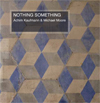 |
Michael Moore - alto saxophone, clarinet
Achim Kaufmann - piano
Nothing/Something, Something/Nothing, and Furthermore: these three discs document a twenty-five year musical relationship, with improvisations, original songs and interpretations of Herbie Nichols' pieces On 31A, 31B and 31C: "Michael Moore and Achim Kaufmann have worked together now for more than 25 years. For much of that time, they were among Amsterdam's estimable expatriate community. The American clarinetist and alto saxophonist settled there in 1982 and never left. The German pianist arrived in the Netherlands in the mid-'90s and stayed until 2009. He's lived in Berlin ever since. That's where these albums were recorded over four sessions in the spring of 2011 and the winter of 2012. They've all been released at once – a cue, I suppose, to digest them whole. Sure, each date has a different operating principle, but they're all of a piece. There's a series of improvisations on one (Nothing Something), a set of compositions on another (Something Nothing), and a session dedicated to the music of Herbie Nichols (Furthermore). Taken together, it's a test of just how far a duo can go. In any number of cases, there would be an endless string of traps. It wouldn't take three hours (170 minutes, to be precise) for many piano-reed duos to devolve into something paralytic, rudderless, or frighteningly dull. But these sessions seem to be a signal moment for Kaufmann and Moore, one for examining every little aspect of how they interact. The music is a monument to sustained, unflinching (and deeply satisfying) introspection. Indeed, if you let yourself explore these discs – straight through, on permanent shuffle, or in stages (I tried a few variations) – you're given a microscopic tour of duo art. These Ramboys are rarely fevered, yet they never stand still. They contain some extraordinary music-making. So where might one begin? Try "Unswaddled Blues," the second improvisation on the first disc, Nothing Something. There are 12 shorter pieces here – each is between two and five minutes – but this is the longest, at more than seven minutes. "Unswaddled Blues" unfurls in stages. It begins with a jarring helicopter effect – mad fluttering clarinet, piano pedal clusters, single notes, then short motifs, circling and circling about. Soon they're into a chase, Kaufmann deep into the left hand, and Moore moving into long tones, one of his terrific yearning calls, beautiful and dark at the bottom end of the horn. As the time gives way, Moore moves into the middle range, and Kaufmann outlines a series of chords. Things become more pensive. Kaufmann crafts a foundation and Moore unearths a gorgeous, wisp of a line, as if it had all been designed before. When the improvisation's first phase gives way to the second, a final turn produces something new (can we call it a coda?): tender and shrill and filled with soaring meditative spaces. Now you're tempted to turn back and listen again. It is open music of the highest, most satisfying kind. When you get to Something Nothing the 14 originals feel like a natural next step. Just three of the pieces are Kaufmann's, yet the spirit here often put me in mind of the pianist's excellent pair of turn-of-the-century groups, Trio Kamosc and the Gueuledeloup Quartet. It might just be the sound of these men together – Moore was the lone horn in each of those bands – but it's also the overarching culture of these new duets. Kaufmann's writing has always maintained an elegant, sharply cut melancholy. "Disappearing," for instance, is a sweet and somber chamber-music line, something North Americans once called European jazz. Moore quietly pulls Kaufmann toward his own improvisation, as the piece bobbles in and out – appearing, receding – giving Kaufmann a chance to refashion every corner of his script. At times, there is such symmetry to the way these men work, that I kept falling into cliché. It may be perverse, but the clichés felt just right – that Moore and Kaufmann were "of the same mind," "in sync," that they were just so comfortable "in the moment." It's all true. What Moore writes can often sound, deep down, like contemporary bop riddles. It's his own freewheeling mode – New Dutch Swing via Eureka, California and the New England Conservatory. To me, "Gravitation" is a Ferris wheel of Michael Moore joy: snakes-and-ladder lines that suddenly stop, a spell of reflection – of genuine beauty – a majestic reminder of the tune (solo piano), a new emboldened turn (Moore), then back to the head. Oddly enough, the poise and purpose of this project delivers its longest uninterrupted level of clarity onFurthermore, the Herbie Nichols date. But that makes sense. Nichols' music has been a real point of reference for them over the years, whether it was on Kaufmann's 2004 solo disc, knives (where he played "2300 Skiddoo"), or in Moore's work with the Instant Composers Pool (Program One: The ICP Orchestra Performs Herbie Nichols, 1984); it's about where they come from, and where they're going. It's jazz, and yet, the singularity of Nichols' writing seems to bring a laser beam to Kaufmann's approach: his untangling of "Double Exposure," for one, where his solo of subtle shifts and simple declarations, gives the tune a new skin. Together, "The Third World" is a vigorous instance of collective interplay that Kaufmann breaks open with a driving bit of force, cracking Nichols' line and reassembling it under and over top Moore. "The Happenings" begins as film noir, then the lovely line appears, some of the warmest classic Nichols, as they set the piece into a delicious, soulful lilt." –Greg Buium, Point of Departure, June, 2014 |




